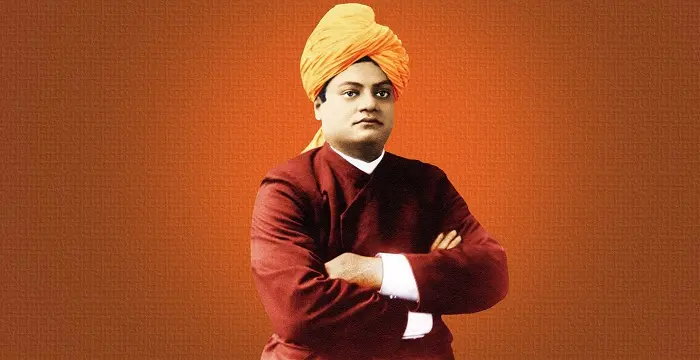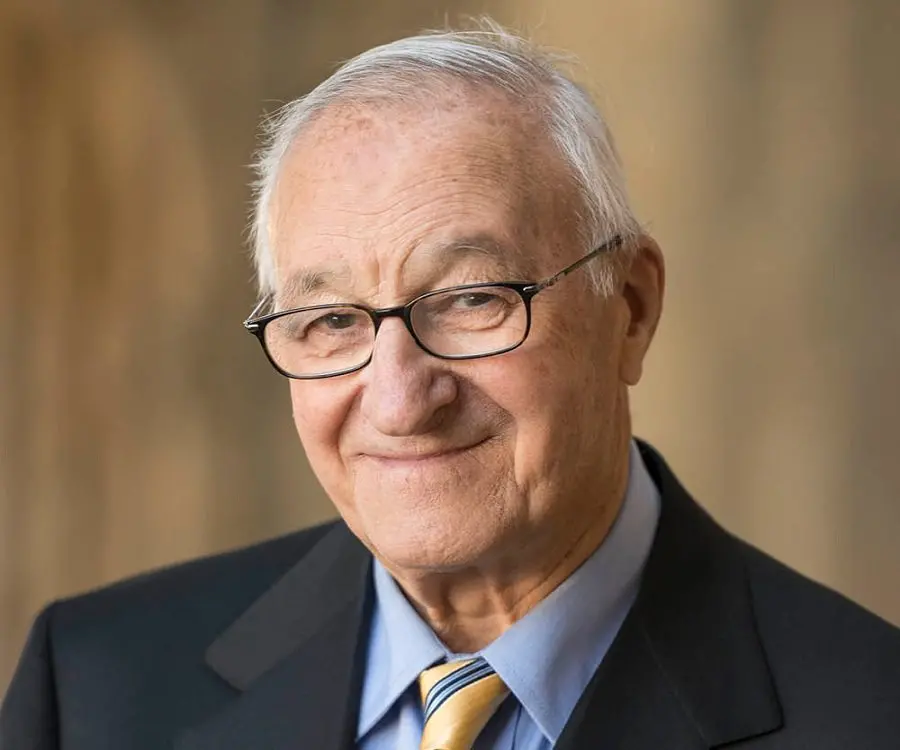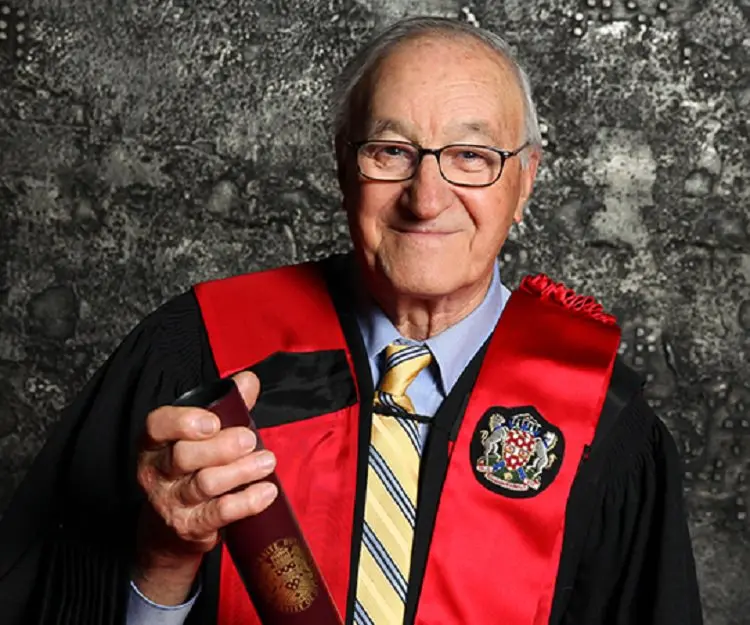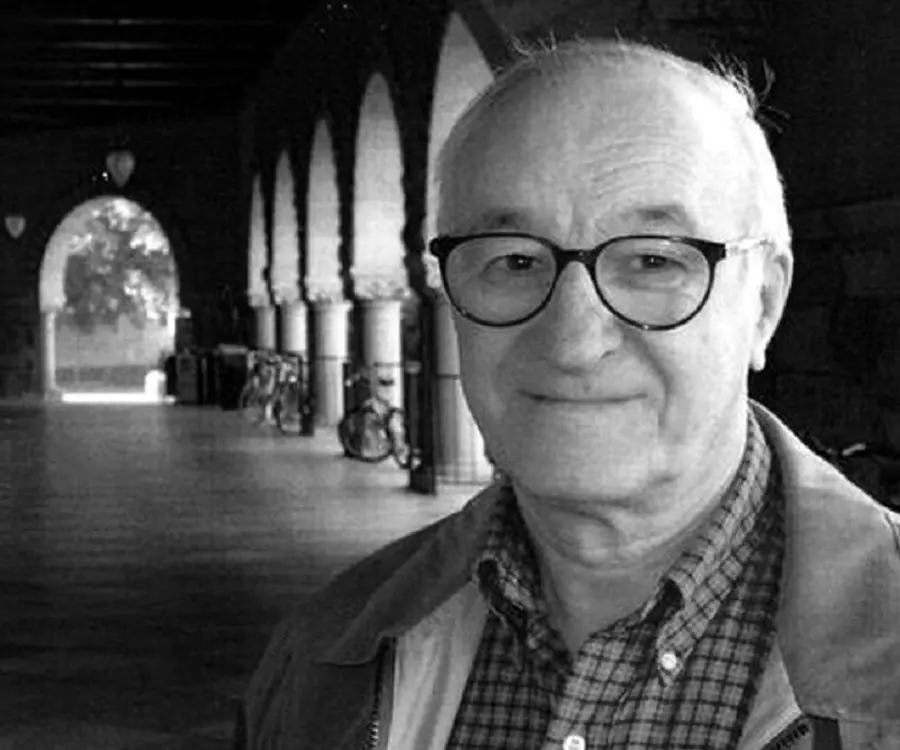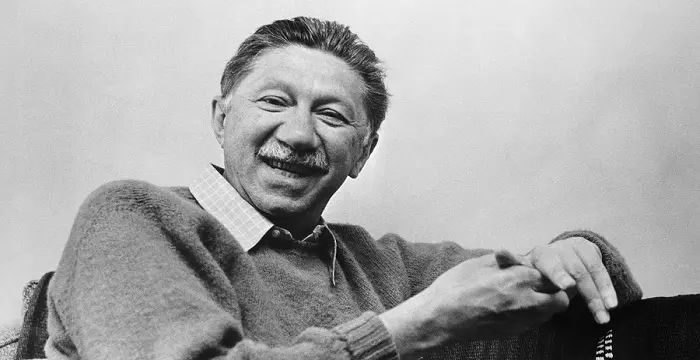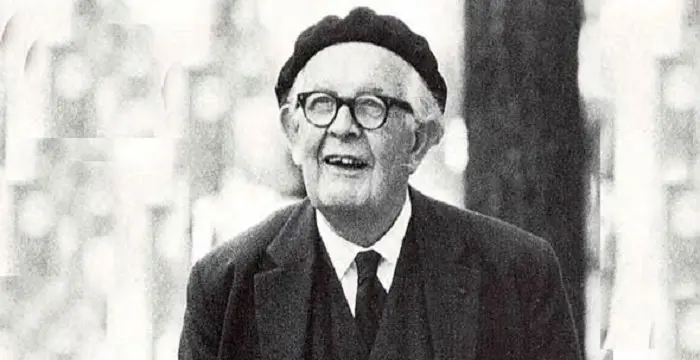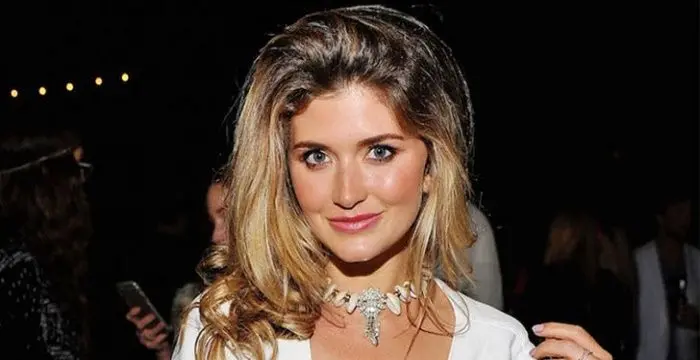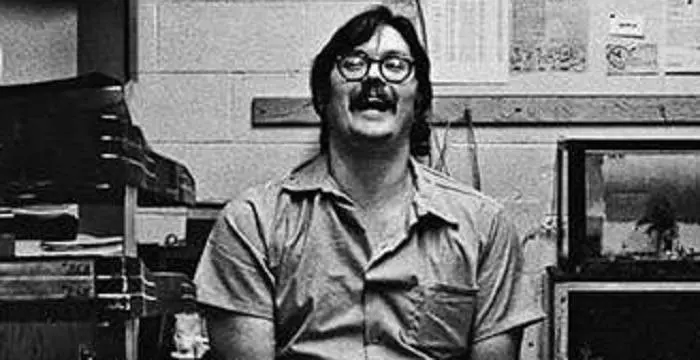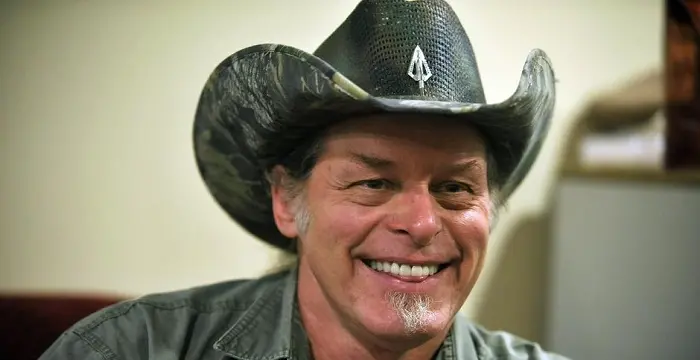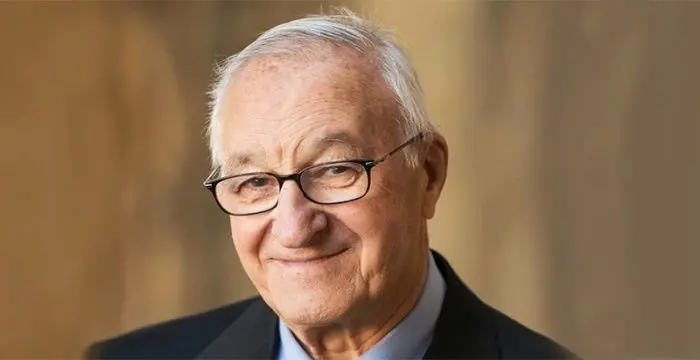
Albert Bandura - Intellectuals & Academics, Career and Childhood
Albert Bandura's Personal Details
Albert Bandura is the most influential psychologist of all times
| Information | Detail |
|---|---|
| Birthday | December 4, 1925 |
| Nationality | Canadian, American |
| Famous | Humanitarian, Intellectuals & Academics, Psychologists |
| Spouses | Virginia Varns |
| Childrens | Carol, Mary |
| Universities |
|
| Birth Place | Mundare |
| Born Country | Canada |
| Gender | Male |
| Sun Sign | Sagittarius |
| Born in | Mundare |
| Famous as | Psychologist |
// Famous Humanitarian
Joyce Meyer
Joyce Meyer is a Christian author and speaker. This biography provides detailed information about her childhood, life, achievements, works & timeline
Swami Vivekananda
Swami Vivekananda was the chief disciple of Sri Ramakrishna, and was responsible for awakening India spiritually. Check this biography to know in detail about his life, profile and timeline.
Nicole Kidman
Nicole Kidman is one of the most talented actors that the Hollywood film industry can boast of. Browse through this biography to get detailed information regarding her life, childhood, profile & timeline
Albert Bandura's photo
Who is Albert Bandura?
Albert Bandura is mostly referenced to as the greatest living psychologist and the most influential psychologist of all times. A David Starr Jordan Professor Emeritus of Social Science in Psychology at Stanford University, he has been relentlessly contributing to the subject for the past six decades and more. Bandura is best known as the initiator of the social learning theory and the theoretical constructor of self-efficacy. He is famed for the 1961 Bobo doll experiment through which he proved that young individuals are influenced by the acts of adults, thus successfully shifting the focus from behaviourism in psychology to cognitive psychology. He further dealt in detail with social cognitive theory and came out with the relationship of self-efficacy and social cognitive theory. From 1968 to 1970, he served as a member of the APA Board of Scientific Affairs and was later appointed as the 82nd President of the American Psychological Association in 1974. To know in details about his life and his works, read through the following lines.
// Famous Psychologists
Abraham Maslow
Abraham Maslow was a humanistic psychologist best known for his theory of self-actualization. This biography of Abraham Maslow provides detailed information about his childhood, life, achievements, works & timeline.
Felicitas Rombold
Felicitas Rombold is a German model, academic and the wife of actor Daniel Brühl. Check out this biography to know about her birthday, childhood, family life, achievements and fun facts about her.
Jean Piaget
Jean Piaget was a psychologist and philosopher known for his theory of cognitive development. This biography of Jean Piaget provides detailed information about his childhood, life, achievements, works & timeline.
Childhood & Early Life
Albert Bandura was the youngest of the six children and the only son born to a small farming family in Mundare Alberta. He had a Ukrainian and Polish descent.
Coming from a small hamlet, educational opportunities were limited. He attained his formal education from a small school. However, he did not limit his learning to the school curriculum and instead indulged in self-education to broaden his knowledge and understanding.
To pursue further studies, he enrolled at the University of British Columbia to gain his graduate degree. It was at the university that he was introduced to academic psychology accidentally.
Since he arrived to school much before the scheduled start of his course, he decided to enrol in a ‘filler course’ to pass his early morning hours. It was then that he took up a psychology course. No sooner, this ‘pass time’ subject sparked his interest so much so that it formed his career.
Completing his graduation in just about three years in 1949, he gained admission at the graduate school at the University of Iowa, which was the epicentre for theoretical psychology then to attain his MA degree. In 1951, he obtained his MA degree and a year later earned his PhD.
Career
It was while at the University that he took a de-tour from the regular behaviourism theory that was prevalent then. Instead, he focussed to come up with a psychological phenomenon that underwent repeated experimental testing.
He put stress on imagery and representation and came about with a relationship between an agent and its environment. Instead of abiding by the psychoanalysis and personology, he aimed to bring about a practical theory about the mental process through observational learning and self-regulation.
Attaining his academic qualification, he took part in the clinical internship at the Wichita Kansas Guidance Center. The following year, i.e. in 1953, he took up a teaching position at the Stanford University.
During the early years, he was influenced by the works of Robert Sears’s social behaviour and identificatory learning. Collaborating with Walters, he engaged in studying social learning and aggression.
According to the social learning theory, he found out that human learning and imitation of behaviour were based on three principles, the stimulus that generates the behavioural response, the response feedback influencing the behavioural response and the cognitive functions in social learning that impacts the behavioural response.
It was after his detailed research that he came up with his first book, ‘Adoloscent Aggression’ in 1959. The book rejected Skinner’s behavioural modifiers in the form of rewards, punishments and positive and negative reinforcements as the main source of treating aggressive children. Instead, it focussed on treating unduly aggressive children by identifying their source of violence.
Further research led to release of his subsequent book, ‘Aggression: A Social Learning Analysis’ in 1973. Continuing further on his experiments and research, in 1977 he came up with hugely influential treatise, ‘Social Learning Theory’ that changed the direction psychology took in the 1980s.
Social Learning Theory was considered novel and innovative in the field of psychology due to its sheer experimental and reproducible nature. It was stark in contrast to the then prevalent theories of Sigmund Freud.
In 1961, he conducted the famous Bobo Doll experiment which changed the course of psychology completely with its shift to cognitive psychology instead of behaviourism.
Through the experiment, he proved that young individuals are influenced by the acts of adults. When adults were praised for their violent behaviour, the children kept hitting the doll to imitate their elders. However, when the adults were rebuffed for their aggressive nature, the children stopped hitting the doll.
Instead of limiting the theory to learning, he aimed at giving a comprehensive view of the human cognition in the context of social learning. He eventually expanded the social learning theory to form the social cognitive theory.
Revising his work yet again to portray humans as self-organizing, proactive, self-reflecting, and self-regulating, he rebuffed the orthodox conception of being governed by external forces and came up with the book, ‘Social Foundations of Thought and Action: A Social Cognitive Theory’ in 1986.
The book, ‘Social Foundations of Thought and Action: A Social Cognitive Theory’ forwarded a more advanced concept of cognitive theory wherein individuals instead of being influenced by external sources for their behaviour were affected by environmental factors and personal factors such as cognitive, affective, and biological events.
He spent much of the late 1970s concentrating on exploring the role of self-efficacy belief in human functioning. Though he concentrated on other factors as well, it was self-efficacy that he believed mediated changes and aroused fear.
The study of self-efficacy belief not only helped in phobia studies but also was found useful for natural disaster survivors and those suffering from post-traumatic stress disorder. It was through sense of control that the traumatic survivors were able to come over their ordeal and look further. In 1997, he finally came out with the book that dealt with the same, titled ‘Self-Efficacy: The Exercise Of Control’.
Awards & Achievements
Over the lifetime, he has been conferred with sixteen honorary doctorate degrees from various universities including University of British Columbia, Alfred University, the University of Rome, the University of Lethbridge, the University of Salamanca in Spain, Indiana University, the University of New Brunswick, Penn State University, Leiden University, and Freie Universitat Berlin, the Graduate Center of the City University of New York, Universitat Jaume I in Spain, the University of Athens and the University of Catania.
In 1974, he was elected to serve as the 82nd President of the American Psychological Association
In 1980, he was elected as the Fellow of the American Academy of Arts & Sciences. Same year, he received an award for Distinguished Scientific Contributions from the American Psychological Association for pioneering the research in the field of self-regulated learning.
In 1999, he was bestowed with the Thorndike Award for Distinguished Contributions of Psychology to Education.
In 2001, he was conferred with the prestigious Lifetime Achievement Award from the Association of Advancement of Behavior Therapy. The Western Psychological Association also bestowed upon him a similar award.
The American Psychological Society presented him with the James McKeen Cattell Award, while the American Psychological Foundation presented him with the Gold Medal Award for Distinguished Lifetime Contribution to Psychological Science
For his relentless contribution to psychology, in 2008, he was presented with the University of Louisville Grawemeyer Award.
Personal Life & Legacy
He tied the nuptial knot with Virginia Varns in 1952. Together, they were blessed with two daughters, Carol and Mary.
Virginia Varns breathed her last in 2011.
Trivia
He is the greatest living psychologist who has served as the originator of social learning theory and the theoretical construct of self-efficacy
// Famous Intellectuals & Academics
Bertil Gotthard Ohlin
Bertil Gotthard Ohlin was a famous Swedish economist. This biography profiles his childhood, family life & achievements.
Emily Greene Balch
Emily Greene Balch was an American economist, sociologist and pacifist who won the 1946 Nobel Peace Prize. This biography of Emily Greene Balch provides detailed information about her childhood, life, achievements, works & timeline.
Martin Buber
One of the greatest philosophers to have ever walked on earth, Martin Buber contributions to philosophy is a long-standing one. Explore all about his profile, childhood, life and timeline here.
Albert Bandura biography timelines
- // 4th Dec 1925Albert Bandura was the youngest of the six children and the only son born to a small farming family in Mundare Alberta. He had a Ukrainian and Polish descent.
- // 1949 To 1951Completing his graduation in just about three years in 1949, he gained admission at the graduate school at the University of Iowa, which was the epicentre for theoretical psychology then to attain his MA degree. In 1951, he obtained his MA degree and a year later earned his PhD.
- // 1952He tied the nuptial knot with Virginia Varns in 1952. Together, they were blessed with two daughters, Carol and Mary.
- // 1953Attaining his academic qualification, he took part in the clinical internship at the Wichita Kansas Guidance Center. The following year, i.e. in 1953, he took up a teaching position at the Stanford University.
- // 1959It was after his detailed research that he came up with his first book, ‘Adoloscent Aggression’ in 1959. The book rejected Skinner’s behavioural modifiers in the form of rewards, punishments and positive and negative reinforcements as the main source of treating aggressive children. Instead, it focussed on treating unduly aggressive children by identifying their source of violence.
- // 1961In 1961, he conducted the famous Bobo Doll experiment which changed the course of psychology completely with its shift to cognitive psychology instead of behaviourism.
- // 1973 To 1980Further research led to release of his subsequent book, ‘Aggression: A Social Learning Analysis’ in 1973. Continuing further on his experiments and research, in 1977 he came up with hugely influential treatise, ‘Social Learning Theory’ that changed the direction psychology took in the 1980s.
- // 1974In 1974, he was elected to serve as the 82nd President of the American Psychological Association
- // 1980In 1980, he was elected as the Fellow of the American Academy of Arts & Sciences. Same year, he received an award for Distinguished Scientific Contributions from the American Psychological Association for pioneering the research in the field of self-regulated learning.
- // 1986Revising his work yet again to portray humans as self-organizing, proactive, self-reflecting, and self-regulating, he rebuffed the orthodox conception of being governed by external forces and came up with the book, ‘Social Foundations of Thought and Action: A Social Cognitive Theory’ in 1986.
- // 1999In 1999, he was bestowed with the Thorndike Award for Distinguished Contributions of Psychology to Education.
- // 2001In 2001, he was conferred with the prestigious Lifetime Achievement Award from the Association of Advancement of Behavior Therapy. The Western Psychological Association also bestowed upon him a similar award.
- // 2008For his relentless contribution to psychology, in 2008, he was presented with the University of Louisville Grawemeyer Award.
- // 2011Virginia Varns breathed her last in 2011.
// Famous Sagittarius Celebrities peoples
Billie Eilish
Billie Eilish Pirate Baird O’Connell is an American singer and songwriter. Check out this biography to know about her childhood, family, personal life, birthday, etc.
Jacelyn Reeves
Jacelyn Reeves is a former flight attendant who once had a fling with Clint Eastwood. Check out this biography to know about her birthday, childhood, family life, achievements and fun facts about her.
Edmund Kemper
Edmund Kemper is a convicted serial killer from America who murdered ten people. Check out this biography to know about his childhood, life, crimes and other facts about him.
Pietro Boselli
Pietro Boselli is an Italian model, engineer, teacher, and fitness athlete who became famous as the ‘world’s sexiest math teacher’. Check out this biography to know about his birthday, childhood, family life, achievements and fun facts about him.
Niqoles Heard
Lil Niqo is an American rapper and musical artist. Let’s take a look at his family and personal life including age, date of birth, net worth, girlfriends, and fun facts.
Ted Nugent
Ted Nugent is a hard rock musician known for his hits ‘Stranglehold’ and ‘Cat Scratch Fever’. This biography of Ted Nugent provides detailed information about his childhood, life, achievements, works & timeline.
Albert Bandura's FAQ
What is Albert Bandura birthday?
Albert Bandura was born at 1925-12-04
Where is Albert Bandura's birth place?
Albert Bandura was born in Mundare
What is Albert Bandura nationalities?
Albert Bandura's nationalities is Canadian, American
Who is Albert Bandura spouses?
Albert Bandura's spouses is Virginia Varns
Who is Albert Bandura childrens?
Albert Bandura's childrens is Carol, Mary
What was Albert Bandura universities?
Albert Bandura studied at University of Iowa (1952), University of Iowa (1951), University of British Columbia (1949)
What is Albert Bandura's sun sign?
Albert Bandura is Sagittarius
How famous is Albert Bandura?
Albert Bandura is famouse as Psychologist

